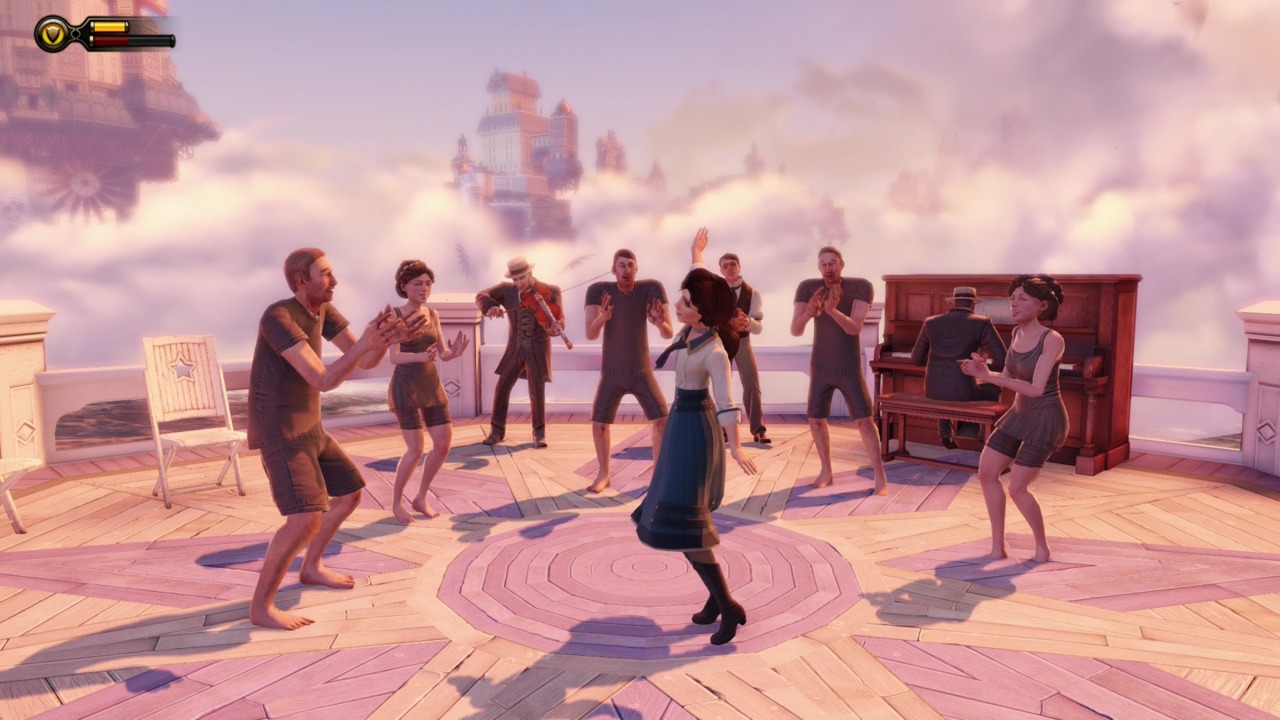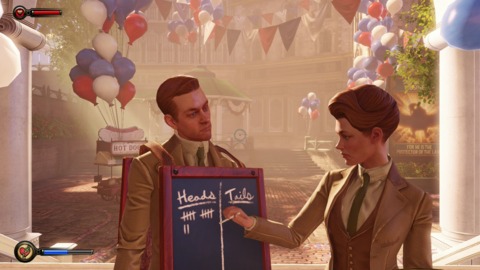My love of the original BioShock is unwavering. Irrational's previous foray into a dystopian society explored the ways in which the foundation of civilization crumbles when everyone has only their own desires in mind. The powerful themes resonated throughout every inch of that modern-day masterpiece. Not only did plasmids add novelty to the combat, they furthered the ideas the game was centered around. Plasmids injected into your veins let you twist your body into an unrecognizable monster, and the enemies you fought against showed how debilitating overuse of these drugs could be. Important figures exemplified how various mindsets would function when the rules of decency were removed. Remember when you explored the blood-soaked hovel of J.S. Steinman, the plastic surgeon trying to carve beauty into unwilling patients now that morals had been absolved? Or when you gazed at the artist Sander Cohen's disturbing masterpieces? BioShock was a terrifying exploration of the manifestation of selfish desires left unchecked.
BioShock Infinite begins with a similarly intriguing premise. Jaded by the unclean, corrupt beasts that rule democratic lands, Zachary Comstock founds a city in the clouds free from the shackles that have been destroying the modern world. Columbia is a place of pure hatred. The elitist settlers believe they are the chosen ones, elevating themselves above the unwashed masses who dared to be a different race or have less money than the privileged few. The stage is set for a sobering exploration of how a segregationist's mentality is ultimately doomed. However, Infinite avoids taking a stance on the situation that it constructs, instead diverting its attention to a pair of characters who encompass tired stereotypes (merciless killer, gifted damsel) that have no relation to the thematic elements set up at the outset. With nothing of value worth exploring, Infinite quickly devolves into a mindless shooter buoyed only by its stunning artistic design.

Booker DeWitt is a guilt-stricken war veteran who readily massacres hundreds of individuals. Relating to the protagonist is nearly impossible, and not just because he's a terrible person whose hands are perpetually drenched in the blood of his enemies. Because Booker's words and actions so often conflict, it's hard to take him seriously. Why would we ever believe that he regrets killing Native Americans at Wounded Knee when he still willingly enters battle zones with murder on his mind? Infinite desperately tries to engender sympathy for Booker by giving him a troubling backstory, but it feels as empty as the rest of this adventure because his motivations are continually ignored to allow for another extended battle sequence. It hardly matters that he's on a rescue mission because there's so little investment in who he is. Instead of offering an emotionally complex individual as the star, Infinite instead introduces a female companion who desperately tries to give the game moral grounding.
Infinite quickly devolves into a mindless shooter buoyed only by its stunning artistic design.
Elizabeth is a bird in a cage, spending her days locked in a tower as she peruses the books that make up her most readily available companions. No average woman, she has extraordinary powers that allow her to open portals to other realms. A strong-willed woman who is well read with abilities that would make a superhero envious doesn't seem like a weak damsel, and yet Infinite trudges down the tired path of using women as prizes, so she's thrust into that role regardless. She's rescued by Booker early on in this adventure, and accompanies him as he mows down the armed citizenry of Columbia. Sadly, she's little more than an item dispersal system with a fancy dress. Elizabeth helpfully tosses ammunition and health when Booker gets low, and unlocks doors, but otherwise she serves as a bystander. She does offer one nice touch of humanity. When Booker kills enemies in particularly violent ways, she recoils in disgust, which is more character development than is found elsewhere.
Located where the sun touches the sky, Columbia is a gorgeous city in which every new location contains its own beautiful touches. Marvel at the intricate railway system connecting one floating section of town to another and appreciate the down-home sensibility of the quaint storefronts. Despite the disgusting people who live there, Columbia is a place where you want to spend your time, gazing at the myriad delights as you listen to the serene music that fills your heart with joy.

Treasure those quiet moments when you're allowed to soak in the stunning sights, because such respite is all too rare. Around every dazzling corner await gun-toting soldiers who are all too eager to make your life miserable. Infinite pushes unceasing waves of attackers your way to ensure little more than a minute passes without your trigger finger seeing action. Sadly, in the six years since BioShock introduced a fascinating world with mediocre shooting mechanics, Irrational has still not been able to inject the core action with the same appeal as the aesthetic wonders. The claustrophobic locations of BioShock's Rapture have been replaced by a sprawling cityscape in which enemies snipe you from across great distances, which transforms the personal conquests of BioShock into exhausting, pixel-hunt ordeals in which you're constantly being peppered by unseen heathens offscreen.
The chaotic endeavors are tiresome rather than thrilling because haphazard enemy placement urges you to sprint pell-mell across Columbia's skies. With no fluctuation in the rhythm of combat, these battles quickly lose what little appeal they offered. There's no deeper strategy necessary to dispatch the brain-dead foes who hunt you, so once you've succeeded in a few encounters, there are few surprises to keep you invested. With exhaustive numbers and thick skins, enemies long overstay their welcome, and there's not even interesting punishment to keep you fearful of death. Fall in battle, and you're resurrected right where you left off. This mechanic was introduced in BioShock and made things too easy back then, and it's even more baffling six years later that this punitive-free system is still being used. It's troubling that Infinite forces you to spend so much time engaged in these boring ordeals. As you fend off attackers for upwards of 20 minutes at a time, it becomes clear that these fights are terrible filler in a game bereft of meaningful content.

The standard assortment of guns Booker carries fail to enliven these excursions. However, vigors imbue you with crazy powers that complement your bullet-spewing antics. By tapping a button, Booker can unleash a murder of crows at enemies, or push them into the setting sun with a blast of water. Shocking enemies with an electrical bolt is certainly more interesting than peppering them with a pistol, but vigors have such little depth that they too grow stale before long. There's little reason to experiment with different powers, because once you have a projectile in your inventory, you can keeping using it until your hand grows tired. More troubling is how little thematic relevance vigors have. Their counterpart in BioShock is plasmids, and there's a reason plasmids exist in Rapture aside from diversifying the combat. But why would the citizens of Columbia, who consider themselves to be better than their peers, deign to infect their bodies with a foreign substance? It doesn't make any sense, and subsequently feels like it's stealing from BioShock without understanding why such powers resonated so deeply in the first place.
As you fend off attackers for upwards of 20 minutes at a time, it becomes clear that these fights are terrible filler in a game bereft of meaningful content.
And then there's the ending. Infinite's argument that an evil megalomaniac will always exist is an extremely cynical outlook. That history shows this is the case doesn't matter, because whether it's true or not isn't important. What is problematic is that Infinite, which desperately tries to avoid making an insightful statement on American exceptionalism or racism, doesn't lay the foundation for such a pronouncement to exist in the first place. Issuing this statement is merely a shallow way to link the universes of the BioShock games. Instead of exploring the inherent problems that would urge Comstock to found Columbia or Andrew Ryan to create Rapture, it takes the easy approach by stating the what without delving into the why. Contrast this late-game revelation with what transpired in BioShock. There, we realized that in a society built on objectivism, the protagonist doesn't even have free will. Such twists are satisfying only when the game builds on them throughout rather than just throwing them in at the end as Infinite does.
Infinite is a poorly conceived adventure that struggles to form a cohesive whole. By borrowing the core elements of BioShock but never working them properly into the narrative, the action is constantly at odds with the story. Infinite stands as one of the greatest disappointments in my gaming life because I know what Irrational is capable of and could only see the squandered potential of its latest foray. Infinite has a fascinating world, in both visual design and story premise, so it's a shame that its vision falters, shying away from exploring any potentially unsettling plot thread in favor of focusing on choppy action sequences that endlessly drag on. BioShock Infinite is an incoherent mess that fails in both its shooting and its story.